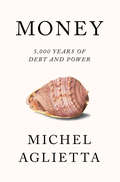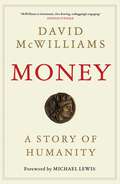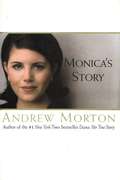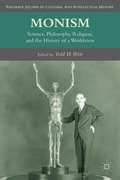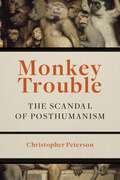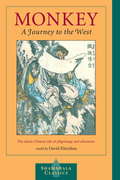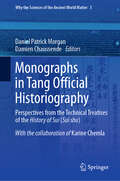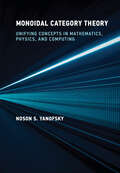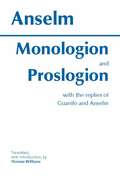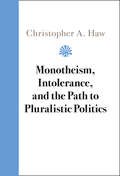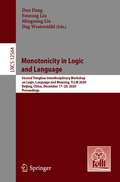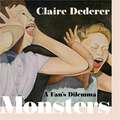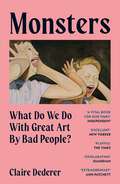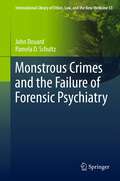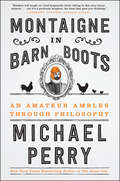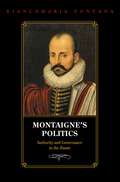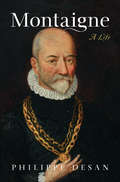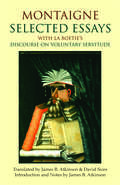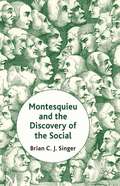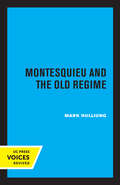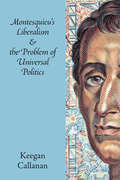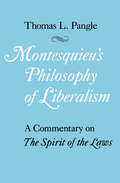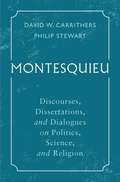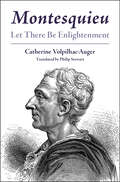- Table View
- List View
Money: 5,000 Years of Debt and Power
by David Broder Michel Aglietta Pepita Ould Ahmed Jean-François PonsotThe major French economist offers a new theory of moneyAs the financial crisis reached its climax in September 2008, the most important figure on the planet was Federal Reserve chairman Ben Bernanke. The whole financial system was collapsing, with little to stop it. When a senator asked Bernanke what would happen if the central bank did not carry out its rescue package, he replied, “If we don’t do this, we may not have an economy on Monday.”What saved finance, and the Western economy, was fiscal and monetary stimulus – an influx of money, created ad hoc. It was a strategy that raised questions about the unexamined nature of money itself, an object suddenly revealed as something other than a neutral signifier of value. Through its grip on finance and the debt system, money confers sovereign power on the economy. If confidence in money is not maintained, crises follow. Looking over the last 5,000 years, Michel Aglietta explores the development of money and its close connection to sovereign power. This book employs the tools of anthropology, history and political economy in order to analyse how political structures and monetary systems have transformed one another. We can thus grasp the different eras of monetary regulation and the crises capitalism has endured throughout its history.
Money: A Story of Humanity
by David McWilliamsIn this groundbreaking book, renowned global economist David McWilliams unlocks the mysteries and the awesome power of money: what it is, how it works, and why it matters.The story of money is the story of our desires, our genius, and our downfalls. Money is power—and power beguiles. Nothing we&’ve invented as a species has defined our own evolution so thoroughly and changed the direction of our planet&’s history so dramatically. Money has shaped the very essence of what it means to be human. We can&’t hope to understand ourselves without it. And yet despite money&’s primacy, most of us don&’t truly understand it. As economist David McWilliams states, money is everything. &“Money defines the relationship between worker and employer, buyer and seller, merchant and producer. But not only that: it also defines the bond between the governed and the governor, the state and the citizen. Money unlocks pleasure, puts a price on desire, art and creativity. It motivates us to strive, achieve, invent and take risks. Money also brings out humanity&’s darker side, invoking greed, envy, hatred, violence and, of course, colonialism.&” Money isn&’t just paper or coins or virtual currency. Money is humanity. Leading economics expert, David McWilliams answers these questions and more in Money, an epic, breathlessly entertaining journey across the world through the present and the past, from the birthplace of money in ancient Babylon to the beginning of trade along the silk road to China, from Marrakech markets to Wall Street and the dawn of cryptocurrency. By tracking its history, McWilliams uncovers our relationship with money, transforming our perspective on its impact on the world right now. McWilliams is no dusty economist; he is a communicator at the highest level, a highly telegenic and marketable expert who is as comfortable in front of a large audience talking about his favourite subject as he is appearing on podcasts, social media, and even in stand-up comedy. He&’s been called Ireland&’s most important economist and is ranked among the leading economists working today. The story of money is the story of earth&’s most inventive, destructive, and dangerous animal: Homo sapiens. It is our story.
Monica's Story
by Andrew Morton"The girl who caught the eye of President Bill Clinton, a man of acknowledged sexual charisma and more than twice her age, is a person of endless contrasts: sure of her own mind yet unsure of herself; possessed of a high sense of entitlement but a low sense of self-worth; a girl with a fierce and sometimes perverse loyalty to others but little regard for her own survival. " -From the Forward
Monism
by Todd H. WeirThe first survey in the English language of the history of naturalistic monism in the works of Haeckel, Spinoza, and others. Contributors demonstrate that, to a greater extent than previously shown, monism provided an essential epistemological framework for numerous religious, political and cultural movements between the 1840s and 1940s.
Monkey Trouble: The Scandal of Posthumanism
by Christopher PetersonAccording to scholars of the nonhuman turn, the scandal of theory lies in its failure to decenter the human. The real scandal, however, is that we keep trying.The human has become a conspicuous blind spot for many theorists seeking to extend hospitality to animals, plants, and even insentient things. The displacement of the human is essential and urgent, yet given the humanist presumption that animals lack a number of allegedly unique human capacities, such as language, reason, and awareness of mortality, we ought to remain cautious about laying claim to any power to eradicate anthropocentrism altogether. Such a power risks becoming yet another self-accredited capacity thanks to which the human reaffirms its sovereignty through its supposed erasure.Monkey Trouble argues that the turn toward immanence in contemporary posthumanism promotes a cosmocracy that absolves one from engaging in those discriminatory decisions that condition hospitality as such. Engaging with recent theoretical developments in speculative realism and object-oriented ontology, as well as ape and parrot language studies, the book offers close readings of literary works by J.M. Coetzee, Charles Chesnutt, and Walt Whitman and films by Alfonso Cuarón and Lars von Trier.Anthropocentrism, Peterson argues, cannot be displaced through a logic of reversal that elevates immanence above transcendence, horizontality over verticality. This decentering must cultivate instead a human/nonhuman relationality that affirms the immanent transcendency spawned by our phantasmatic humanness.
Monkey: A Journey to the West
by David KherdianPart spiritual pilgrimage, part historical epic, the folk novel Journey to the West, which came to be known as Monkey, is the most popular classic of Asian literature. Originally written in the sixteenth century, it is the story of the adventures of the rogue-trickster Monkey and his encounters with a bizarre cast of characters as he travels to India with the Buddhist pilgrim Tripitaka in search of sacred scriptures. Much more than a picaresque adventure novel, Monkey is a profound allegory of the struggle that must occur before spiritual transformation is possible. David Kherdian's masterful telling brings this classic of Chinese literature to life in a way that is true to the scope and depth of the original.
Monographs in Tang Official Historiography: Perspectives from the Technical Treatises of the History of Sui (Sui shu) (Why the Sciences of the Ancient World Matter #3)
by Daniel Patrick Morgan Damien ChaussendeThis book examines the role of medieval authors in writing the history of ancient science. It features essays that explore the content, structure, and ideas behind technical writings on medieval Chinese state history. In particular, it looks at the Ten Treatises of the current History of Sui, which provide insights into the writing on the history of such fields as astronomy, astrology, omenology, economics, law, geography, metrology, and library science. Three treatises are known to have been written by Li Chunfeng, one of the most important mathematicians, astronomers, and astrologers in Chinese history.The book not only opens a new window on the figure of Li Chunfeng by exploring what his writings as a historian of science tell us about him as a scientist and vice versa, it also discusses how and on what basis the individual treatises were written.The essays address such themes as (1) the recycling of sources and the question of reliability and objectivity in premodern history-writing; (2) the tug of war between conservatism and innovation; (3) the imposition of the author’s voice, worldview, and personal and professional history in writing a history of a field of technical expertise in a state history; (4) the degree to which modern historians are compelled to speak to their own milieu and ideological beliefs.
Monoidal Category Theory: Unifying Concepts in Mathematics, Physics, and Computing
by Noson S. YanofskyA comprehensive, cutting-edge, and highly readable textbook that makes category theory and monoidal category theory accessible to students across the sciences.Category theory is a powerful framework that began in mathematics but has since expanded to encompass several areas of computing and science, with broad applications in many fields. In this comprehensive text, Noson Yanofsky makes category theory accessible to those without a background in advanced mathematics. Monoidal Category Theorydemonstrates the expansive uses of categories, and in particular monoidal categories, throughout the sciences. The textbook starts from the basics of category theory and progresses to cutting edge research. Each idea is defined in simple terms and then brought alive by many real-world examples before progressing to theorems and uncomplicated proofs. Richly guided exercises ground readers in concrete computation and application. The result is a highly readable and engaging textbook that will open the world of category theory to many. Makes category theory accessible to non-math majorsUses easy-to-understand language and emphasizes diagrams over equationsIncremental, iterative approach eases students into advanced conceptsA series of embedded mini-courses cover such popular topics as quantum computing, categorical logic, self-referential paradoxes, databases and scheduling, and knot theoryExtensive exercises and examples demonstrate the broad range of applications of categorical structures Modular structure allows instructors to fit text to the needs of different courses Instructor resources include slides
Monologion and Proslogion: with the replies of Gaunilo and Anselm
by Anselm Thomas Williams"Williams's translations are scrupulously faithful and accurate without being slavishly literal, and yet are lively and graceful." --Paul Vincent Spade, Indiana University
Monotheism, Intolerance, and the Path to Pluralistic Politics
by Christopher A. HawDiscussions of monotheism often consider its bigotry toward other gods as a source of conflict, or emphasize its universality as a source of peaceful tolerance. Both approaches, however, ignore the combined danger and liberation in monotheism's 'intolerance.' In this volume, Christopher Haw reframes this important argument. He demonstrates the value of rejecting paradigms of inclusivity in favor of an agonistic pluralism and intolerance of absolutism. Haw proposes a model that retains liberal, pluralistic principles while acknowledging their limitations, and he relates them to theologies latent in political ideas. His volume offers a nuanced, evolutionary, and historical understanding of the biblical tradition's emergence and its political consequences with respect to violence. It suggests how we can mediate impasses between liberal and conservative views in culture wars; between liberal inclusivity and conservative decisionism; and, on the religious front, between apologetics for exclusive monotheism and critiques of its intolerance.
Monotonicity in Logic and Language: Second Tsinghua Interdisciplinary Workshop on Logic, Language and Meaning, TLLM 2020, Beijing, China, December 17-20, 2020, Proceedings (Lecture Notes in Computer Science #12564)
by Fenrong Liu Mingming Liu Dun Deng Dag WesterståhlEdited in collaboration with FoLLI, the Association of Logic, Language and Information this book constitutes the refereed proceedings of the Second Interdisciplinary Workshop on Logic, Language, and Meaning, TLLM 2020, held in Tsinghua, China, in December 2020. The 12 full papers together presented were fully reviewed and selected from 40 submissions.Due to COVID-19 the workshop will be held online.The workshop covers a wide range of topics where monotonicity is discussed in the context of logic, causality, belief revision, quantification, polarity, syntax, comparatives, and various semantic phenomena in particular languages.
Monsters: A Fan’s Dilemma
by Claire DedererA passionate, provocative and blisteringly smart interrogation of how we experience art in the age of #MeToo, and whether we can separate an artist's work from their biography.What do we do with the art of monstrous men? Can we love the work of Roman Polanski and Michael Jackson, Hemingway and Picasso? Should we love it? Does genius deserve special dispensation? Is history an excuse? What makes women artists monstrous? And what should we do with beauty, and with our unruly feelings about it?Claire Dederer explores these questions and our relationships with the artists whose behaviour disrupts our ability to apprehend the work on its own terms. She interrogates her own responses and her own behaviour, and she pushes the fan, and the listener, to do the same. Morally wise, deeply considered and sharply written, Monsters gets to the heart of one of our most pressing conversations.(P) 2023 Penguin Audio
Monsters: A Fan’s Dilemma
by Claire Dederer'An exhilarating, shape-shifting exploration of the perilous boundaries between art and life' JENNY OFFILL'An incredible book, the best work of criticism I have read in a very long time' NICK HORNBY'Wise and bold and full of the kind of gravitas that might even rub off' LISA TADDEOA passionate, provocative and blisteringly smart interrogation of how we experience art in the age of #MeToo, and whether we can separate an artist's work from their biography.What do we do with the art of monstrous men? Can we love the work of Roman Polanski and Michael Jackson, Hemingway and Picasso? Should we love it? Does genius deserve special dispensation? What makes women artists monstrous? And what should we do with beauty, and with our unruly feelings about it?Claire Dederer explores these questions and our relationships with the artists whose behaviour disrupts our ability to understand the work on its own terms. She interrogates her own responses and behaviour, and she pushes the fan, and the reader, to do the same. Morally wise, deeply considered and sharply written, Monsters gets to the heart of one of our most pressing conversations.'A blisteringly erudite and entertaining read . . . It's a book that deserves to be widely read and will provoke many conversations' NATHAN FILER'Fascinating . . . Dederer poses so many topical questions, plays with so many pertinent ideas, that I'm still thinking about this book long after I finished it' CLAIRE FULLER
Monstrous Crimes and the Failure of Forensic Psychiatry
by John Douard Pamela D. SchultzThe metaphor of the monster or predator--usually a sexual predator, drug dealer in areas frequented by children, or psychopathic murderer--is a powerful framing device in public discourse about how the criminal justice system should respond to serious violent crimes. The cultural history of the monster reveals significant features of the metaphor that raise questions about the extent to which justice can be achieved in both the punishment of what are regarded as "monstrous crimes" and the treatment of those who commit such crimes. This book is the first to address the connections between the history of the monster metaphor, the 19th century idea of the criminal as monster, and the 20th century conception of the psychopath: the new monster. The book addresses, in particular, the ways in which the metaphor is used to scapegoat certain categories of crimes and criminals for anxieties about our own potential for deviant, and, indeed, dangerous interests. These interests have long been found to be associated with the fascination people have for monsters in most cultures, including the West. The book outlines an alternative public health approach to sex offending, and crime in general, that can incorporate what we know about illness prevention while protecting the rights, and humanity, of offenders. The book concludes with an analysis of the role of forensic psychiatrists and psychologists in representing criminal defendants as psychopaths, or persons with certain personality disorders. As psychiatry and psychology have transformed bad behavior into mad behavior, these institutions have taken on the legal role of helping to sort out the most dangerous among us for preventive "treatment" rather than carceral "punishment."
Montaigne in Barn Boots: An Amateur Ambles Through Philosophy
by Michael PerryThe beloved memoirist and bestselling author of Population: 485 reflects on the lessons he’s learned from his unlikely alter ego, French Renaissance philosopher Michel de Montaigne."The journey began on a gurney," writes Michael Perry, describing the debilitating kidney stone that led him to discover the essays of Michel de Montaigne. Reading the philosopher in a manner he equates to chickens pecking at scraps—including those eye-blinking moments when the bird gobbles something too big to swallow—Perry attempts to learn what he can (good and bad) about himself as compared to a long-dead French nobleman who began speaking Latin at the age of two, went to college instead of kindergarten, worked for kings, and once had an audience with the Pope. Perry "matriculated as a barn-booted bumpkin who still marks a second-place finish in the sixth-grade spelling bee as an intellectual pinnacle . . . and once said hello to Merle Haggard on a golf cart."Written in a spirit of exploration rather than declaration, Montaigne in Barn Boots is a down-to-earth (how do you pronounce that last name?) look into the ideas of a philosopher "ensconced in a castle tower overlooking his vineyard," channeled by a midwestern American writing "in a room above the garage overlooking a disused pig pen." Whether grabbing an electrified fence, fighting fires, failing to fix a truck, or feeding chickens, Perry draws on each experience to explore subjects as diverse as faith, race, sex, aromatherapy, and Prince. But he also champions academics and aesthetics, in a book that ultimately emerges as a sincere, unflinching look at the vital need to be a better person and citizen.
Montaigne's Politics: Authority and Governance in the Essais
by Biancamaria FontanaMichel de Montaigne (1533-92) is principally known today as a literary figure--the inventor of the modern essay and the pioneer of autobiographical self-exploration who retired from politics in midlife to write his private, philosophical, and apolitical Essais. But, as Biancamaria Fontana argues in Montaigne's Politics, a novel, vivid account of the political meaning of the Essais in the context of Montaigne's life and times, his retirement from the Bordeaux parliament in 1570 "could be said to have marked the beginning, rather than the end, of his public career." He later served as mayor of Bordeaux and advisor to King Henry of Navarre, and, as Fontana argues, Montaigne's Essais very much reflect his ongoing involvement and preoccupation with contemporary politics--particularly the politics of France's civil wars between Catholics and Protestants. Fontana shows that the Essais, although written as a record of Montaigne's personal experiences, do nothing less than set forth the first major critique of France's ancien régime, anticipating the main themes of Enlightenment writers such as Voltaire and Diderot. Challenging the views that Montaigne was politically aloof or evasive, or that he was a conservative skeptic and supporter of absolute monarchy, Fontana explores many of the central political issues in Montaigne's work--the reform of legal institutions, the prospects of religious toleration, the role of public opinion, and the legitimacy of political regimes.
Montaigne: A Life
by Steven Rendall Lisa Neal Philippe DesanOne of the most important writers and thinkers of the Renaissance, Michel de Montaigne (1533–92) helped invent a literary genre that seemed more modern than anything that had come before. But did he do it, as he suggests in his Essays, by retreating to his chateau, turning his back on the world, and stoically detaching himself from his violent times? In this definitive biography, Philippe Desan, one of the world's leading authorities on Montaigne, overturns this longstanding myth by showing that Montaigne was constantly concerned with realizing his political ambitions—and that the literary and philosophical character of the Essays largely depends on them. The most comprehensive and authoritative biography of Montaigne yet written, this sweeping narrative offers a fascinating new picture of his life and work.As Desan shows, Montaigne always considered himself a political figure and he conceived of each edition of the Essays as an indispensable prerequisite to the next stage of his public career. He lived through eight civil wars, successfully lobbied to be raised to the nobility, and served as mayor of Bordeaux, special ambassador, and negotiator between Henry III and Henry of Navarre. It was only toward the very end of Montaigne’s life, after his political failure, that he took refuge in literature. But, even then, it was his political experience that enabled him to find the right tone for his genre.In this essential biography, we discover a new Montaigne—caught up in the events of his time, making no separation between private and public life, and guided by strategy first in his words and silences. Neither candid nor transparent, but also not yielding to the cynicism of his age, this Montaigne lends a new depth to the Montaigne of literary legend.
Montaigne: with La Boétie's Discourse on Voluntary Servitude
by Michel De Montaigne James B. Atkinson David SicesA superb achievement, one that successfully brings together in accessible form the work of two major writers of Renaissance France. This is now the default version of Montaigne in English. --Timothy Hampton, Professor of French and Comparative Literature, University of California, Berkeley
Montesquieu and the Discovery of the Social
by Brian C. J. SingerMontesquieu is often considered the first social thinker. Today, when 'the end of the social' has been proclaimed, it is time to reconsider its beginnings. In a wide-ranging, original interpretation of The Spirit of the Laws, this book explores what did it mean to 'discover the social', and what can it mean to recover the social today?
Montesquieu and the Old Regime
by Mark HulliungThis title is part of UC Press's Voices Revived program, which commemorates University of California Press’s mission to seek out and cultivate the brightest minds and give them voice, reach, and impact. Drawing on a backlist dating to 1893, Voices Revived makes high-quality, peer-reviewed scholarship accessible once again using print-on-demand technology. This title was originally published in 1976.
Montesquieu's Liberalism and the Problem of Universal Politics
by Keegan CallananThis book provides a fresh interpretation of Montesquieu's political philosophy and its enduring significance. It demonstrates the coherence of the two core elements of Montesquieu's project, his liberal constitutionalism and his critique of political universalism.
Montesquieu's Philosophy of Liberalism: A Commentary on the Spirit of the Laws
by Thomas L. PangleThis first comprehensive commentary on The Spirit of the Laws uncovers and explicates the plan of Montesquieu's famous but baffling treatise. Pangle brings to light Montesquieu's rethinking of the philosophical groundwork of liberalism, showing how The Spirit of the Laws enlarges and enriches the liberal conception of natural right by means of a new appeal to History as the source of basic norms.
Montesquieu: Discourses, Dissertations, and Dialogues on Politics, Science, and Religion (Bibliotheque Du Xviiie Siecle Ser. #19)
by Philip Stewart David W. CarrithersA number of Montesquieu's lesser-known discourses, dissertations and dialogues are made available to a wider audience, for the first time fully translated and annotated in English. The views they incorporate on politics, economics, science, and religion shed light on the overall development of his political and moral thought. They enable us better to understand not just Montesquieu's importance as a political philosopher studying forms of government, but also his stature as a moral philosopher, seeking to remind us of our duties while injecting deeper moral concerns into politics and international relations. They reveal that Montesquieu's vision for the future was remarkably clear: more science and less superstition; greater understanding of our moral duties; enhanced concern for justice, increased emphasis on moral principles in the conduct of domestic and international politics; toleration of conflicting religious viewpoints; commerce over war, and liberty over despotism as the proper goals for mankind.
Montesquieu: Let There Be Enlightenment (Oxford University Studies In The Enlightenment Ser. #2005:05)
by Catherine Volpilhac-AugerSince the last biography of Montesquieu in English (Shackleton, Oxford, 1961) Montesquieu scholarship has been entirely renewed, culminating in a critical edition of his complete works in twenty-two volumes that is nearing completion. Since 1998, this new edition of the complete works has considerably modified what was known about Montesquieu and his procedures, eliciting new translations and further studies. Additionally, several thousand manuscript pages were made public in 1994 and continue to generate further scholarly inquiry. The author of this compact biography, originally published by Gallimard 2017, is the director of the critical edition of the works and the most qualified scholar of Montesquieu. At once an introduction to Montesquieu's thought and a synthesis of current knowledge about his life and work, this book is full of insights and revised judgements about Montesquieu and how his political philosophy helped thrust Enlightenment onto the European agenda.
Montesquieu: The Spirit of the Laws
by Anne M. Cohler Basia Carolyn Miller Harold Samuel Stone Charles De MontesquieuThe Spirit of the Laws is without question one of the central texts in the history of eighteenth-century thought, yet there has been no complete scholarly English language edition since 1750. This lucid translation renders Montesquieu's problematic text newly accessible to a fresh generation of students, helping them to understand why Montesquieu was such an important figure in the early enlightenment and why The Spirit of the Laws was such an influence on those who framed the American Constitution. Fully annotated, this edition focuses on Montesquieu's use of sources and his text as a whole, rather than on those opening passages toward which critical energies have traditionally been devoted.
